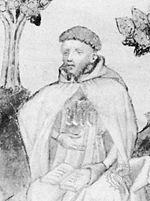Richard Rolle
| Richard Rolle | |
|---|---|

Richard Rolle, detail from “Religious Poems,” early 15th century (Cotton Ms. Faustina B. VI)
|
|
| Born | c.1290/1300 |
| Died | 1349 |
| Residence | Hampole, Yorkshire |
| Nationality | English |
| Other names | Richard Rolle of Hampole |
| Education | University of Oxford |
| Known for | Hermit, religious writer, Bible translator |
| Richard Rolle | |
|---|---|
| Venerated in | Anglican Communion |
| Feast | 20 January (Church of England) 28 September (Episcopal Church (USA)) |
Richard Rolle (1290/1300– late September 1349) was an English hermit, mystic, and religious writer. He is also known as Richard Rolle of Hampole or de Hampole, since at the end of his life he lived near a Cistercian nunnery in Hampole, Yorkshire. In the words of Nicholas Watson, scholarly research has shown that "[d]uring the fifteenth century he was one of the most widely read of English writers, whose works survive in nearly four hundred English...and at least seventy Continental manuscripts, almost all written between 1390 and 1500."
In his works, Rolle provides little explicit evidence about his early life and education. Most, if not all, of our information about him comes from the Office of Lessons and Antiphons that was composed in the 1380s in preparation for his canonisation, although this never came about.
Born into a small farming family and brought up at Thornton-le-Dale near Pickering, he studied at the University of Oxford, where he was sponsored by Thomas de Neville, the Archdeacon of Durham. While there, he is said to have been more interested in theology and biblical studies than philosophy and secular studies. He left Oxford at age eighteen or nineteen - dropping out before he received his MA - to become a hermit. Leaving the family home, he first went to Pickering, and housed with a squire, John Dalton, for perhaps three years.
It was probably while still living with Dalton, two years and eight months after becoming a hermit, Rolle had his first mystical experience. Around a year later, he felt similarly after listening to a choir, and he began to take less interest in all things temporal.
Dalton himself was arrested and his lands confiscated in 1322; the lack of mention of this fact in accounts of Rolle's life makes it likely that he was no longer living with Dalton by this point.
"I felt within me a merry and unknown heat...I was expert it was not from a creature but from my Maker, as it grew hotter and more glad."
It is unclear where Rolle lived from 1321/2 until his death in 1349. One theory is that Rolle spent the early 1320s at the renowned Sorbonne, becoming well-trained in theology, and perhaps being ordained there. This theory is based on the entries in three seventeenth-century manuscripts at the Sorbonne, assumed to be copies of medieval originals, which record a Ricardus de Hampole as being admitted to the Sorbonne in 1320, entering the prior's register in 1326, and noting that he died in 1349 among the sisters of Hampole near Doncaster in Yorkshire. Scholars, however, are divided on the authenticity of this material. Whether or not Rolle studied in Paris, it is probable that most if not all of this time was spent in Richmondshire, either living with his family at Yafforth, or, given the uncertain political conditions in the region at the time, wandering from patron to patron.
...
Wikipedia
